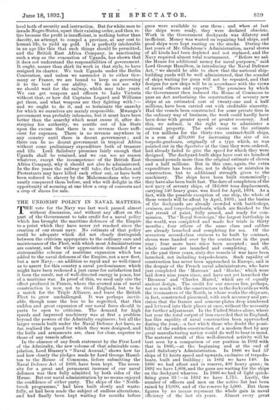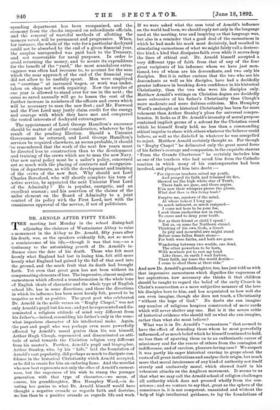THE UNIONIST POLICY IN NAVAL MATTERS. T HE vote for the
Navy was last week passed almost without discussion, and without any effort on the part of the Government to take credit for a naval policy which has brought the maritime defences of the Empire to a point which they have never yet reached since the creation of our steam navy. No estimate of that policy could be adequate which did not clearly distinguish between the criticism appropriate to the ordinary care and maintenance of the Fleet, with which most Administrations are content, and the wider appreciation demanded for a statemanlike scheme of maritime expansion which has added to the naval defences of the Empire, not a new fleet, but a new Navy,—an addition so rapid and so well-timed as to assert for this country a naval predominance which might have been reckoned a just cause for satisfaction had it been the result, not of well-directed energy in peace, but of a maritime war. In proof of this, we need only cite the effect produced in France, where the avowed aim of naval construction is now, not to rival England, but to be a match for the Triple Alliance, and leave the British Fleet to grow unchallenged. It was perhaps inevit- able, though none the less to be regretted, that this sudden and great expansion of our naval force should in parts be open to criticism. The demand, for high speeds and improved machinery was at first a problem beyond the powers of the Admiralty engineers ; but all the larger vessels built under the Naval Defence Act have, so far, realised the speed for which they were designed, and the hulls and armaments are, class for class, superior to those of any vessels afloat.
In the absence of any fresh statement by the First Lord of the Admiralty, the new volume of that admirable com- pilation, Lord Brassey's "Naval Annual," shows how far and how closely the pledges made by Lord George Hamil- ton to the House of Commons, before submitting the Naval Defence Act of 1889, have been kept. The neces- sity for a great and permanent increase of our naval defences was then fully admitted by both sides of the House. But our naval administration by no means enjoyed the confidence of either party. The ships of the "North- brook programme," had been built slowly and waste- fully, or had been made the subject of endless alterations, and had finally been kept waiting for months before guns were available to arm them ; and when at last the ships were ready, they were declared obsolete. Work in the Government dockyards was dilatory and inefficient. Money was wasted on repairing bad ships, and good ships were kept rusting on the stocks. During the last years of Mr. Gladstone's Administration, naval stores of all kinds had been depleted and not replaced, and the Navy required almost total rearmament. "Before we ask the House for additional money for naval purposes," said Lord George Hamilton, in introducing the Naval Defence Act, "we should be able to show that the national ship- building yards will be well administered, that the scandal of ships waiting for guns will not be repeated, and that designs for new ships will be in accordance with the views of naval officers and experts." The promises by which the Government then induced the House of Commons to pass an Act authorising the construction of seventy new ships at an estimated cost of twenty-one and a half millions, have been carried out with creditable sincerity. Had the vessels been constructed for some private firm in the ordinary way of business, the work could hardly have been done with greater speed or greater economy. And this, we submit, is the right way to administer a national property. The sole excess on the estimate of ten millions for the thirty-two contract-built ships, is a sum of £70,000 for increasing the size of six torpedo-gunboats, originally of a type which, as was pointed out in the Spectator at the time they were ordered, had already failed to give the speed for which they were designed. The dockyard-built ships have cost six hundred thousand pounds more than the original estimate of eleven and a half millions. But in this case, again, the extra expenditure has been due, not to delays or mistakes in construction, but to additional strength given to the machinery. The ships have been built economically ; they have also been built fast. The date of completion of the new navy of seventy ships, of 316,000 tons displacement, carrying 540 heavy guns, was fixed for April, 1894. As a. fact, with the possible exception of one ship, the whole of these vessels will be afloat by April, 1893; and the basins of the dockyards are already crowded with battleships, cruisers, and torpedo-gunboats, which are finished to the last streak of paint, fully armed, and ready for com- mission. The Royal Sovereign,' the largest battleship in the world, was completed and made her trials in thirty months ; four others of the same class and calibre are already launched and completing for sea. Of the seventeen second-class cruisers to be built by contract, eleven were handed over by the contractors in the past year ; four more have since been accepted ; and the whole number are launched and completing. In all, in the past three years, sixty-five vessels of war have been launched, not including torpedo-boats. Such rapidity of construction has never been approached in Europe, and is the despair of the French naval administrators, who have just completed the • Marceau ' and Hoche,' which were laid down nine years since, and have not yet launched the Brennus ' and Charles Martel,' which are of equally ancient design. The credit for our success lies, perhaps, not so much with the constructors in the dockyards as with the ironmasters of the North, in whose works the ships are, in fact, constructed piecemeal, with such accuracy and pre- cision that the frames and armour-plates drop numbered and lettered into their places at once, without the necessity for further adjustment. In the United States alone, where last year the total output of iron exceeded that in England, has this rapidity of naval construction been approached during the year,—a fact which those who doubt the possi- bility of the sudden construction of a modern fleet by any great manufacturing nation would do well to bear in mind. The material result of this well-directed activity will be best seen by a comparison of our position in 1892 with that in 1886,—at the beginning and at the end of Lord Salisbury's Administration. In 1886 we had 57 ships of 15 knots speed and upwards, exclusive of torpedo- boats, built and building ; in 1892 we have 140. In 1886 we had afloat and in reserve, 499 heavy guns ; in 1892 we have 1,868, and the guns are waiting for the ships on the dockyard wharves. In 1886 we had of light quick- firing guns 33 !—in 1892 we have 1,715. Lastly, the number of officers and men on the active list has been raised by 13,000, and of the reserve by 5,000. But these figures by no means represent the whole gain in naval efficiency of the last six years. Almost every great -spending department has been reorganised, and the -economy from the checks imposed on subordinate officials, and the removal of wasteful methods of allotting the ,moneys voted, will be permanent and progressive. When, for instance, the whole of the vote for a particular dockyard could not be absorbed by the end of a given financial year, the surplus unexpended was paid back to the Treasury, and not recoverable for naval purposes. In order to avoid returning the money, and to secure its expenditure for the benefit of the "yard," the most scandalous extra- vagance was often had recourse to, to account for the sum which the near approach of the end of the financial year .did not allow to be usefully spent. Men were employed • en " overtime " at increased wages, or work was under- taken on ships not worth repairing. Now the surplus of .ene year is allowed to stand over for use in the next ; the -sums so saved annually will go to lessen the cost of the further increase in numbers of the officers and crews which will be necessary to man the new fleet ; and Mr. Forwood • and the First Lord may justly claim credit for the energy and courage with which they have met and conquered ‘the vested interests of dockyard extravagance.
The appointment of Lord George Hamilton's successor • Should be matter of careful consideration, whatever be the result of the pending Election. Should a Unionist Government be returned, and Lord George Hamilton's services be required elsewhere, as seems probable, it should tbe remembered that the work of the next few years must -be directed less to construction than to the development -and training of the crews which are to mau the new Navy. Our new naval policy must be a sailor's policy, concerned not so much with the placing of contracts and reorganisa- tion of departments, as with the development and training of the crews of the new fleet. Why should not Lord .Charles Beresford, who will shortly complete his turn of .active service, be appointed the next Unionist First Lord of the Admiralty ? He is popular, energetic, and an excellent seaman ; and his assertion of the claims of the sailor element on the Board of Admiralty to a joint control of its policy with the First Lord, met with the -unanimous approval of the service, if not of politicians.







































 Previous page
Previous page